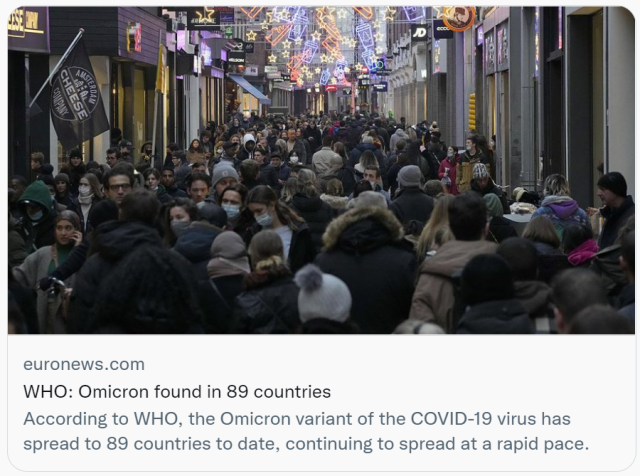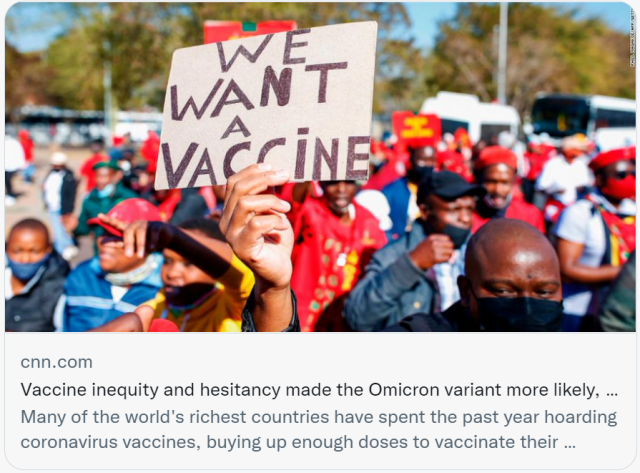WHO stated that the COVID-19 pandemic must be ended this year
- Aspirin: Study Finds Greater Benefits for These Colorectal Cancer Patients
- Cancer Can Occur Without Genetic Mutations?
- Statins Lower Blood Lipids: How Long is a Course?
- Warning: Smartwatch Blood Sugar Measurement Deemed Dangerous
- Mifepristone: A Safe and Effective Abortion Option Amidst Controversy
- Asbestos Detected in Buildings Damaged in Ukraine: Analyzed by Japanese Company
WHO stated that the COVID-19 pandemic must be ended this year
- Red Yeast Rice Scare Grips Japan: Over 114 Hospitalized and 5 Deaths
- Long COVID Brain Fog: Blood-Brain Barrier Damage and Persistent Inflammation
- FDA has mandated a top-level black box warning for all marketed CAR-T therapies
- Can people with high blood pressure eat peanuts?
- What is the difference between dopamine and dobutamine?
- How long can the patient live after heart stent surgery?
WHO stated that the COVID-19 pandemic must be ended this year. Can it be achieved?
The World Health Organization (WHO for short) has made the latest statement on the end of the COVID-19 pandemic.
On December 20th, WHO Director-General Tedros Adhanom Ghebreyesus called for an end to the COVID-19 pandemic in 2022.
To do this, the whole world needs to work together to make difficult decisions to eliminate global (vaccine) inequality, Tedros added.
What is a pandemic?
On March 11, 2020, after the outbreak of the COVID-19 epidemic, WHO announced that the current epidemic situation can be characterized as a pandemic.
The BBC pointed out that the WHO had always avoided this statement before, and the WHO finally chose to use the term “pandemic” because it found that the “degree of inaction” in many countries around the world was alarming.
“Pandemic” is one of the previous classifications of influenza by WHO. According to WHO documents, influenza is mainly divided into 6 levels.
The highest level is “Pandemic”, which refers to the occurrence of human-to-human transmission of the virus. Community-level outbreaks have occurred in at least two countries in a WHO region, and in at least one other country in a different WHO region.

WHO Director-General Dr. Tedrosi said that the world must unite to end the COVID-19 pandemic in 2022. /Social media screenshot
In 2009, the H1N1 influenza outbreak in the United States and Mexico was also classified as a “pandemic” by the WHO.
It is worth noting that the “pandemic” mainly refers to the scope of the virus, not the severity of the epidemic and the fatality rate.
At present, WHO no longer uses the 6-level classification to evaluate infectious diseases such as influenza, but instead changes it to interpandemic phase, alert phase, pandemic phase, and transition phase. four stages.
Although the World Health Organization no longer uses Level 6 influenza classification, the COVID-19 pneumonia is the first coronavirus infectious disease called a “pandemic.”
Today, Tedros said that he will end the “pandemic” next year. The expert, a professor of virology at the University of Hong Kong, said in an interview with a reporter that, by definition, this means that the COVID-19 epidemic can be effectively controlled in most areas, and by then the COVID-19 virus may have varying degrees on Epidemic in different regions. , but the world will no longer regard it as a “pandemic” that is serious enough to threaten the world.
How much influence does Omicron have in ending the pandemic?
Just when Dr. Tedrosi proposed that the world should work together to end the COVID-19 pandemic in 2022, the Omicron variant is raging in many countries.
Agence France-Presse pointed out that since the first report of the mutant in South Africa in November , the rapid spread of Omicron has extinguished people’s hope that the worst of the epidemic is about to pass.
On December 18, local time, the WHO pointed out in a technical briefing that as of December 16, the Omicron mutant had appeared in 89 countries and regions around the world.

WHO: Omicron has been discovered in 89 countries and regions. /Social media screenshot
According to early research results, Omicron is not more serious than the still dominant Delta variant, but data shows that Omicron is more infectious and its resistance to vaccines is also worrying.
Omicron may not have too much influence on the overall pace of the global end of the “pandemic.” The expert said that data show that the fatality rate of the vaccinated population caused by the delta variant has dropped to 0.1%, that is, among the vaccinated population, the situation of delta is similar to that of ordinary flu, which can at least be regarded as the end of the pandemic.
At present, there are no signs that Omicron will cause a more serious situation. The expert pointed out that with the widespread vaccination in the future and the establishment of an immune barrier, the situation may improve significantly. Therefore, Dr. Tedrosi’s statement about the end of the “pandemic” in 2022 is also expected.
What are the difficulties in ending the “pandemic”?
Although the statement to end the “pandemic” in 2022 is encouraging, there are still many difficulties to achieve this goal.
Dr. Tedrosi pointed out that if the pandemic is to end next year, vaccine inequality must be eliminated.
In the past year, many wealthy countries in the world have stockpiled COVID-19 vaccines and have never fulfilled their promise to share vaccines with developing countries. The WHO called this practice “self-defeating” and “immoral.”
According to WHO data, only 7.5% of people in low-income countries have received at least one dose of vaccine, while 63.9% of people in high-income countries have received at least one dose of vaccine.
As of October this year, WHO has delivered 537 million doses of vaccine to 144 countries through the “COVID-19 Pneumonia Vaccine Implementation Plan (COVAX)”.
Its goal is to vaccinate 40% of the world’s population by the end of 2021. This figure will be expanded to 70% in the middle of next year. However, CNN pointed out that this goal does not seem to be achieved at present.

The inequality of vaccination makes the emergence of variants such as Omicron more likely. /Social media screenshot
Unequal vaccinations around the world may further lead to the spread of the epidemic.
Scientists and public health experts believe that the huge gap in vaccination rates between developed and developing countries may be the “culprit” in the spread of Omicron.
This new variant shows that the world needs more equitable access to vaccines and other public Sanitary tools.
To eliminate vaccine inequality, WHO’s leadership is indispensable. The expert believes that another key to ending the global “pandemic” is to strengthen the leadership of the WHO.
It should take the lead in concentrating resources to produce vaccines and realizing the fair distribution of vaccines, demonstrating its important role in the field of public health.
This is both a challenge and an opportunity for WHO. On this basis, all countries in the world must also cooperate so that the end of the “pandemic” can be achieved steadily and accurately.
WHO stated that the COVID-19 pandemic must be ended this year
(source:internet, reference only)
Disclaimer of medicaltrend.org
Important Note: The information provided is for informational purposes only and should not be considered as medical advice.



